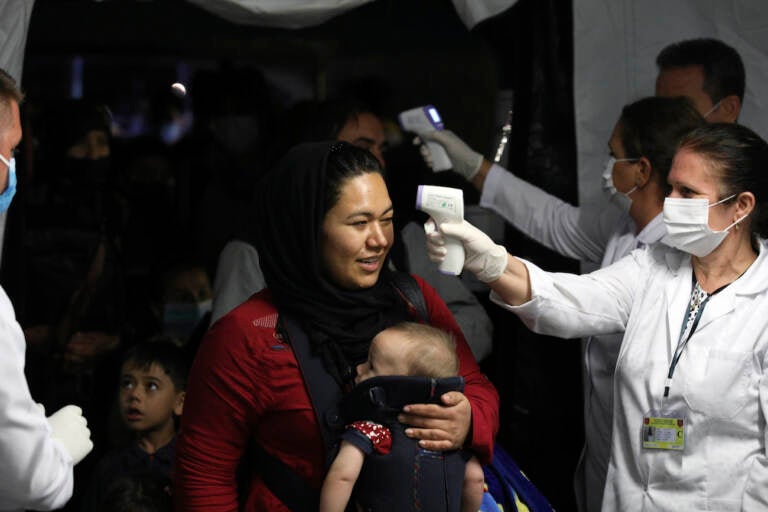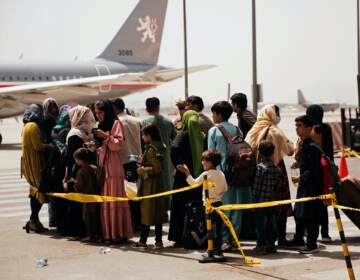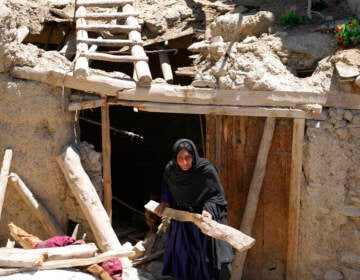Do you speak Dari or Pashto? Philly wants your help welcoming displaced Afghans
Philadelphia health officials are searching for translators to help usher displaced Afghans into the U.S. — specifically people who speak Dari or Pashto.

Health workers checks the temperature of evacuated citizens from Afghanistan upon their arrival at Tirana International Airport in Tirana, Albania, Friday, Aug. 27, 2021. A government decision has planned that the Afghans may stay at least a year during which they will proceed with their application for special visas before they move on to the US for final settlement. (AP Photo/Franc Zhurda)
Philadelphia health officials are searching for translators to help usher displaced Afghans into the U.S. — specifically people who speak Dari or Pashto.
It’s still not clear exactly when people will begin arriving at the Philadelphia International Airport, which the Biden administration tapped as one of the first places to begin welcoming refugees fleeing from the violence that has engulfed Afghanistan in the wake of the U.S. withdrawal from the country and the Taliban’s swift takeover.
The Philadelphia Inquirer has reported that 200 to 300 refugees are expected to be taken to Camden after arriving in Philadelphia, and that they’re due at the airport sometime on Friday or Saturday.
Jim Garrow, a spokesman for Philadelphia’s Department of Public Health, says a lot of the details about arrival and resettlement are still being worked out by a network of city, state and federal agencies and nonprofits. But he said one thing is already clear: the more people who can help overcome language barriers, the better.
“We want to be able to do these operations, do the screening and the triaging, in a way that is approachable and they understand what’s happening,” he said. “We certainly don’t want it to happen in English.”
The volunteer Philadelphia Medical Reserve Corps has been activated to help to screen the arriving Afghans for COVID-19 and other medical issues, and Garrow says anyone who can speak Dari or Pashto can sign up to volunteer with the group on the city’s website.
City officials will reach out to anyone with the necessary language skills and get them signed up for the MRC.
Once the Afghans make it through customs and border control and medical triage, they’ll officially be refugees and will begin the resettlement process — the details of which, city officials said, are still unclear.
Local groups assisting with the resettlement efforts include the Nationalities Service Center and HIAS Pennsylvania. People interested in helping can contact those groups for details on how they might be able to help newly-arrived Afghans.
Ahead of the Afghans’ arrival, Gov. Tom Wolf issued a statement reiterating his willingness to have Pennsylvania serve “as a resource and a safe, welcoming home” for refugees.
“As we continue to collaborate with the federal government, my administration offers support to organizations and communities, and asks community leaders for flexibility and understanding,” he said.
The administration sent a letter to refugee resettlement groups asking that “local leaders in communities that may soon become home to new Pennsylvanians resettled in our commonwealth exercise flexibility as this process moves forward,” and offering assistance from the state level.
It sent another to municipalities urging them to “help make your communities a welcoming and tolerant place for people relocated and resettled in Pennsylvania.”

Get daily updates from WHYY News!
WHYY is your source for fact-based, in-depth journalism and information. As a nonprofit organization, we rely on financial support from readers like you. Please give today.







